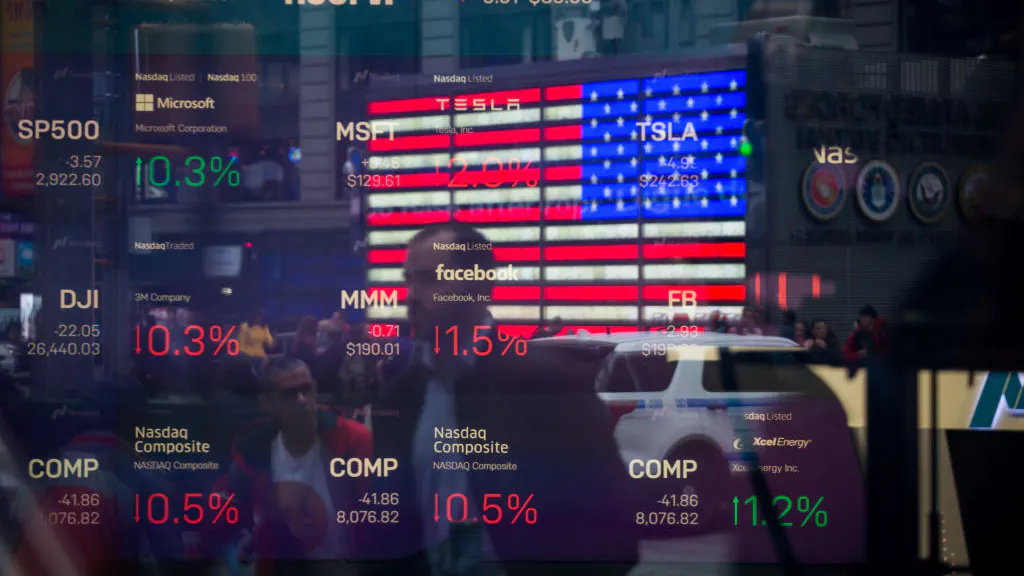As the stock market goes down the tubes, Wall Street investors are reaping the whirlwind of their addiction to woke investing.
Environmental, Social, and Governance (ESG) investing, which is in vogue among leading corporations and financiers, has suffered the most in the current downturn. ESG investors tend to select stocks from growth industries like technology, which often favor short-term yields over long-term results. Though tech companies are well known for bankrolling social justice initiatives in reaction to national events like the death of George Floyd or the overturning of Roe v. Wade, they were the first to lay off large portions of their staff as the stock market began its months-long tailspin.
For instance, iShares’ ESG Aware MSCI ETF — which has its largest holdings in companies like Apple, Microsoft, Amazon, and Tesla — is down over 21% since the beginning of 2022, slightly lower than the overall S&P 500 index. Meanwhile, iShares’ Global Energy ETF — dominated by oil and gas conglomerates like Exxon Mobil, Chevron, and Shell — has risen nearly 16% over the same time period.
“The ESG movement’s realization that shunning traditional energy companies sacrifices profits proves what everyone else already knew: virtue signaling isn’t free,” entrepreneur Vivek Ramaswamy, who recently launched an asset management firm centered upon “excellence capitalism,” told The Daily Wire. “Large asset managers are desperate to go back to the days of investing money to make money, but their hands are tied by the ESG rope of their own making.”
Asset managers BlackRock, Vanguard, and State Street — which, on average, control a combined 20% stake in every Fortune 500 company and manage $21 trillion — have advanced ESG efforts within the ranks of their portfolio companies. By adopting ESG goals, companies commit themselves to pursuing green energy adoption, appointing a certain number of racial minorities to serve as executives, or otherwise mingling profitability with progressive politics.
Investor and author Jerry Bowyer, who serves as a senior fellow at the Center for Cultural Leadership, told The Daily Wire that recent stock market outcomes prove that “ESG is not a serious approach to investing for return.”
“If ESG vendors would openly admit that they were moving their gaze away from the pursuit of returns for their clients, it would be more defensible,” Bowyer argued. “Clients would then know that they’re likely making a little offering to the gods of social responsibility in the form of lower returns. But what has happened is that the ESG industry has pretty consistently denied the return sacrifice and engaged in highly speculative arguments that ESG is good for shareholders.”
A November 2019 report from consulting firm McKinsey, for example, argues that companies which intentionally lower their energy consumption can benefit from cost reductions and reap higher returns by avoiding investment opportunities that “may not pay off because of longer-term environmental issues.”
Bowyer said that state treasurers are currently noticing that “arbitrarily excluding a major center of value creation such as oil, gas, and coal companies is not consistent with their fiduciary responsibility to pension investors.” Indeed, several Republican state treasurers have sounded the alarm over Wall Street’s efforts to use ESG metrics as an excuse to discriminate against public financing efforts from states with conservative values.
“The world of retirement funds is waking up to the problems earlier because the law is clearer regarding obligations to put investor interests first,” Bowyer remarked. “But in general, those people in the industry who are closest to investors — for example, financial advisors — are more aware of ESG problems than the top-down part of the industry in gigantic institutional money management.”
While large asset managers continue to push ESG, an exclusive Daily Wire poll conducted by Echelon Insights recently indicated that there is a desire among American investors for more opportunities apart from progressive investing. Respondents recognized that ESG tends to promote “more liberal positions” than “more conservative positions.” While 50% believe the former and 16% believe the latter, only 21% believe that ESG investing is neutral.
David Bahnsen, the founder of Manhattan-based wealth management firm The Bahnsen Group, told The Daily Wire that “the pendulum will swing” away from “ESG insanity” in light of recent stock market trends.
“But along the way, will there be ongoing damage from those who have already dug their heels in? I am sure that is true, too,” he added. “The objective must be for markets to punish the ESG zealots enough that market forces usher in a reasonable pivot. Here, I do not merely mean stock prices, but rather the response of employees, managers, vendors, suppliers, and more.”
Indeed, the pendulum may be swinging among the broader American population. While 29% of respondents to The Daily Wire’s poll agreed it is a “good thing” for companies to leverage their financial power for political or social means supported by executives, 58% — twice as many — said it is a “bad thing.”

Continue reading this exclusive article and join the conversation, plus watch free videos on DW+
Already a member?

.png)
.png)

